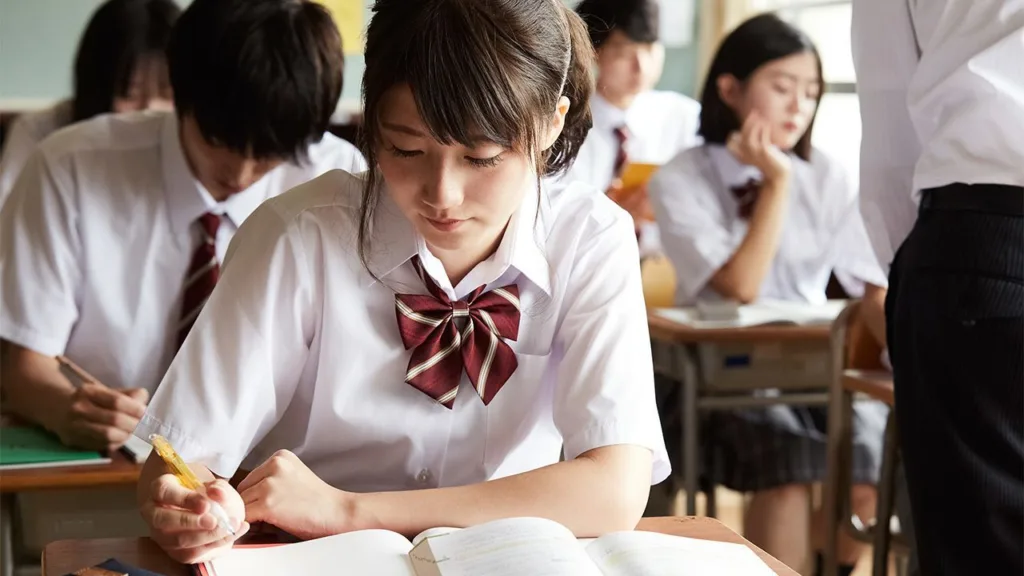Chuunibyou, or eighth grader syndrome, is a phenomenon that has been observed in Japan and other parts of the world. It refers to the tendency of early teens to have grandiose delusions, a desire to stand out, and a belief in hidden knowledge or secret powers.
While it is primarily associated with middle-school second-year students, chuunibyou can also affect individuals who have not grown out of it. In Japan, it is not considered a mental illness, but rathr a colloquial term used to describe a particular behavior.
Symptoms of chuunibyou can include a desire to dress in a particular way, often involving dark clothing and accessories, and the use of made-up words or phrases. Individuals with the condition may also engage in role-playing games or create elaborate backstories for themselves.
Despite the often-cringeworthy behavior associated with chuunibyou, it is important to remember that it is a natural part of adolescent development. As young people navigate the changes and challenges of puberty, they may feel a sense of confusion or insecurity. Chuunibyou may be a way for them to cope with these feelings and assert their independence.
If you are concerned that you or someone you know may be experiencing chuunibyou, it is important to seek the advice of a healthcare professional. While it is not considered a mental illness, it can be a sign of other underlying issues that should be addressed.
Chuunibyou is a fascinating and complex phenomenon that highlights the challenges of adolescence. By understanding its origins and effects, we can better support young people as they navigate this important stage of life.
Exploring the Existence of Eighth Grade Syndrome
Eighth grade syndrome, also known as Chuunibyou in Japan, does exist. It refers to a common teenage behavior whre adolescents, typically in their eighth grade, indulge in self-important fantasies, feel super-special snowflakey, and believe they know it all. This behavior is not limited to Japan and is observed in many cultures worldwide. However, Chuunibyou is also used in Japan to refer to people who have not grown out of this behavior even though they are long past eighth grade. This phenomenon is often portrayed in Japanese anime and manga, where characters exhibit exaggerated behaviors associated with Chuunibyou. Therefore, it is safe to say that eighth grade syndrome exists and is a common behavior observed in teenagers worldwide.

Is Chuunibyou a Form of Mental Illness?
Chuunibyou, also known as “eighth-grader syndrome”, is a term that refers to a state of mind where individuals, usually adolescents, create and immerse themselves in a fantasy world. This phenomenon is often characterized by the adoption of extravagant and exaggerated behaviors, such as using made-up names, dressing up in costumes, and creating fictional personas.
Although characters in the anime refer to chuunibyou as a “sickness”, it is actually not considered a kind of mental illness. Chuunibyou is not listed in the Diagnostic and Statistical Manual of Mental Disorders (DSM), which is the standard classification of mental disorders used by mental health professionals in the United States and many other countries.
Furthermore, chuunibyou is not typically associted with significant distress or impairment in daily functioning, which are key criteria for diagnosing a mental illness. While it is true that some individuals may struggle with social or emotional challenges related to their chuunibyou behavior, this does not necessarily mean that they have a mental illness.
Chuunibyou is not considered a mental illness. Rather, it is a stage of development that some individuals may go through, typically during adolescence, as they explore their identities and imagination.
The Effects of Middle School Syndrome
Middle school syndrome, also known as Chūnibyō in Japanese, refers to a condition where early teenagers develop grandiose delusions and a desperate need to stand out. They often convince themselves that they possess secret knowledge or powers that set them apart from their peers. This syndrome is typically observed in second-year middle school students, hence the term “second-year syndrome.” Middle school syndrome is characterized by a range of behaviors, including the adoption of unusual clothing styles, the creation of imaginary personas or alter-egos, and the use of esoteric or made-up language. While this syndrome is not considered a medical condition, it can impact the social development and mental health of affected individuals. It is important for parents and educators to povide support and encourage healthy self-expression in children displaying signs of middle school syndrome.
Exploring the Reality of Middle School Syndrome
Middle school syndrome, also known as middle child syndrome, is a term often used to describe the feelings of neglect or isolation experienced by middle children in a family. While some people believe this is a real phenomenon, there is no scientific evidence to support the idea that middle children are inherently more prone to feeling this way. However, it is true that middle children may sometimes feel overlooked or overshadowed by their siblings and may struggle to find their place in the family dynamic. It’s important for parents to be aware of these potential challenges and to make an effort to give each of their children equal attention and support. With the right kind of support and communication, middle children can thrive and feel just as loved and valued as their siblings.
Is It Possible to be 14 Years Old and in the 8th Grade?
It is entirely possible for a student to be 14 years old while in the 8th grade. The age range for 8th-grade students is typically 13-14 years old, although some students may be younger or older depending on their individual circumstances. It is not uncommon for students to repeat a grade or start school a year later, which could result in them being older when they reach 8th grade. Additionally, some school districts may have different age requirements or cutoff dates that could affect the age range of students in a particulr grade. Ultimately, a student’s age in the 8th grade will depend on a variety of factors, but being 14 years old is certainly within the realm of possibility.

How Does 8th Grade Impact College Admissions?
8th grade does not have a direct impact on college admissions. Colleges primarily focus on a student’s high school performance, including grades, extracurricular activities, and standardized test scores. However, the skills and habits developed in 8th grade can indirectly influence a student’s college application. For instance, if a student develops strong study habits and time management skills in middle school, they are more likely to continue tose habits in high school and achieve higher grades, which can positively impact their college application. Additionally, participating in extracurricular activities or volunteer work in 8th grade can help students develop skills and interests that they can continue to pursue in high school and include on their college applications. while 8th grade itself does not directly affect college admissions, the habits and skills developed in middle school can indirectly impact a student’s college application.
Understanding Peter Pan Disorder
Peter Pan Syndrome, also known as Peter Pan disorder or syndrome, is a term used to describe individuals who struggle to mature and take on adult responsibilities. This term comes from the character Peter Pan in the popular children’s story who never wanted to grow up. Individuals with Peter Pan Syndrome may display behaviors such as avoiding commitment, being impulsive, lacking direction, and struggling to maintain relationships. They may also exhibit narcissistic personality traits, believing that they are special and entitled to special treatment. People with Peter Pan Syndrome may find it challenging to maintain a job or take on adult responsibilities, often preferring to engage in activities that are typically associted with youth. It is important to note that Peter Pan Syndrome is not a recognized medical or psychological disorder, but rather a term used to describe specific patterns of behavior. It is essential for individuals who may exhibit these behaviors to seek help and guidance from mental health professionals to address any underlying issues and develop healthy coping mechanisms to manage their responsibilities.
Understanding Hebephrenic Schizophrenia
Hebephrenic schizophrenia is a type of schizophrenia that is characterized by disorganized thinking, unusual speech patterns, flat affect, and emotions that do not fit the situation. People with this type of schizophrenia may have difficulty expressing themselves clearly, and their thoughts may seem jumbled or illogical. They may also exhibit unusual behaviors, such as giggling or grimacing inappropriately. Additionally, people with hebephrenic schizophrenia may have difficulty with daily activities, such as maintaining personal hygiene or managing their finances. It is important to note that hebephrenic schizophrenia is just one of severl subtypes of schizophrenia, and treatment may vary depending on the individual’s specific symptoms and needs.
Can Chuunibyou Syndrome Be Cured?
Chuunibyou, also known as “middle school syndrome”, is a condition where individuals exhibit exaggerated and delusional behavior, often seen in adolescents. While there is no known cure for chuunibyou, it is generally considered to be a phase that most people grow out of as they get older and mature. However, for some individuals, chuunibyou may persist into adulthood and affect ther daily life and relationships. In such cases, therapy and counseling may be recommended to help manage the symptoms of chuunibyou and improve overall well-being. It is important to note that chuunibyou is not a recognized medical disorder and should not be confused with serious mental health conditions.

The Difficulty of Middle School Grades
According to many educators and experts, the hardest grade in middle school is seventh grade. This is because it is a time of significant changs and challenges that can be overwhelming for many students. At this age, students are going through puberty, which means they are dealing with hormonal changes that can affect their emotions and behavior. Additionally, they are transitioning from elementary school to high school, which can be a significant adjustment. Academic expectations also increase in seventh grade, with more challenging coursework and higher expectations for independent work. All of these factors can make seventh grade a challenging year for many students, making it widely regarded as the toughest year of middle school.
Understanding the Meaning of Chuuni Phase
A chuuni phase, also known as chuunibyou, is a term used to describe a period of time in a person’s life, usually during adolescence, where they exhibit behavior that is considered to be embarrassing or cringe-worthy. This behavior often includes a desire to stand out, a fixation on fantasy or fictional characters, and an exaggerated sense of self-importance. The term “chuunibyou” is derived from the Japanese words “chuugakkou ni nensei” which means “middle school second-year”, as this is the age group that is most commonly associated with this behavior. While it is a normal part of development for many young people to go through a chuuni phase, it is often seen as a source of ridicule and embarrassment by thse around them.
The Causes of Depression in Middle School Students
Depression is a complex mental health condition that can affect individuals at any age, including those in middle school. One of the main reasons why depression is so prevalent in middle school is due to the significant amount of pressure that students face in their academic and social lives. In middle school, students are expected to transition from learning the basics of reading, writing, and math to developing critical thinking skills, which oten involves completing more complex assignments that require greater levels of focus and concentration. This academic pressure can be overwhelming for some students and may lead to feelings of anxiety, stress, and hopelessness. Additionally, middle school is a time when social dynamics are constantly evolving, and students may feel pressure to fit in with their peers or may experience bullying, exclusion, or social rejection. All of these factors can contribute to feelings of loneliness, isolation, and sadness, which can increase the risk of depression. It’s essential for parents and educators to be aware of the signs of depression in middle school students and to provide appropriate support and resources to promote positive mental health and well-being.
Do Middle School Grades Matter?
It is generally true that colleges do not consider middle school grades as part of their admissions process. However, this does not mean that middle school grades do not matter at all. Middle school is a crucial period of academic development for students, where they lay the foundation for high school and beyond. The habits and skills that students develop during this time can significantly impact their future academic performance.
For instance, a student who consistently earns low grades in middle school may struggle to catch up in high school, where the curriculum becomes more challenging, and the pace becomes more rigorous. Similarly, middle school is an excellent time for students to explore their interests and discover their academic strengths. By taking challenging courses and performing well in them, students can build their confidence and set temselves up for success in high school and beyond.
In short, while middle school grades may not directly impact college admissions, they are still an essential factor in a student’s academic journey. Students who use middle school to prepare for high school effectively are more likely to achieve higher grades, develop good study habits, and get into their dream colleges.

The Impact of Depression in Middle School
It is possible for middle school students to experience depression. Depression is a mood disorder that can affect people of any age, including children and adolescents. Middle school is a time of significant change and transition, which can make some students vulnerable to depression. Common causes of depression in middle school include academic pressure, social isolation, family conflict, hormonal changes, and traumatic experiences. Symptoms of depression in middle school students may include persistent feelings of sadness, hopelessness, and worthlessness, a lack of interest in activities they once enjoyed, changes in appetite and sleep patterns, difficulty concentrating, and thoughts of suicide. It’s essential for parents and teachers to be aware of the signs of depression in middle school students and to seek professional help if necessary. With the riht treatment, including therapy and medication if needed, most students with depression can recover and go on to lead happy and healthy lives.
Understanding the Impact of Depression in Middle School
Depression is not uncommon among middle school students. Studies have shown that approximately 1 in 5 adolescents experience depression at some point during teir teenage years. It’s important to note that feeling sad or moody at times is normal, but if those feelings persist for weeks, months, or longer and affect a student’s ability to function well in school or with peers, it may be a sign of depression. Middle school is a time of significant change and stress for students, and it’s not uncommon for them to experience feelings of sadness or anxiety. However, if these feelings persist and interfere with daily life, it’s important to seek professional help.
Conclusion
Eighth grader syndrome, or chuunibyou, is a phenomenon commonly observed in early teens in Japan. It is characterized by grandiose delusions, a desire to stand out, and a belief in hidden knowledge or secret powers. While it may seem like a form of mental illness, it is not considered as such. Rather, it is a natural part of development and a way for young people to explore and express ther identity. While it may be viewed as a temporary phase for some, others may continue to exhibit chuunibyou behaviors into adulthood. It is important to understand and respect the experiences of those who may be going through eighth grader syndrome, and to provide support and guidance as needed.
